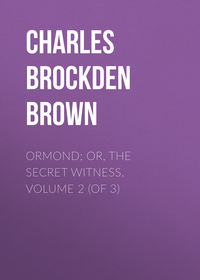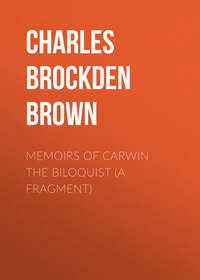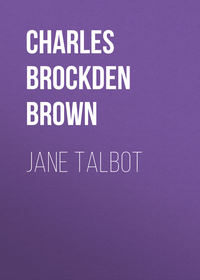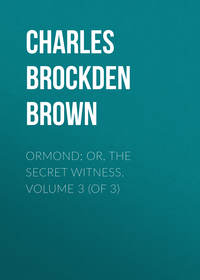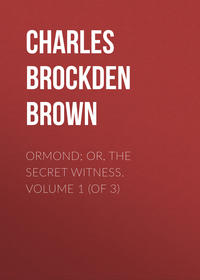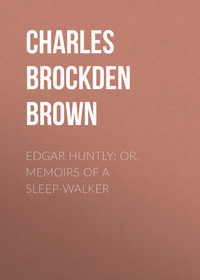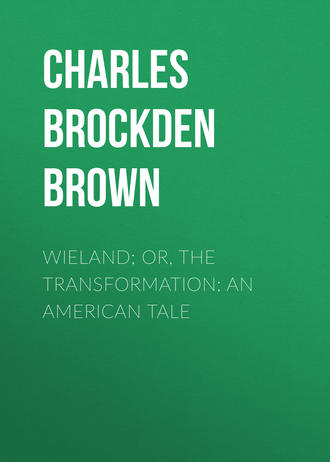 полная версия
полная версияWieland; Or, The Transformation: An American Tale
This was her whom he loved. I was not surprised at the agitations which he betrayed. "But how was the information procured? How was the truth of this news connected with the circumstance of Catharine's remaining in our company?" He was for some time inattentive to my questions. When he spoke, it seemed merely a continuation of the reverie into which he had been plunged.
"And yet it might be a mere deception. But could both of us in that case have been deceived? A rare and prodigious coincidence! Barely not impossible. And yet, if the accent be oracular—Theresa is dead. No, no," continued he, covering his face with his hands, and in a tone half broken into sobs, "I cannot believe it. She has not written, but if she were dead, the faithful Bertrand would have given me the earliest information. And yet if he knew his master, he must have easily guessed at the effect of such tidings. In pity to me he was silent."
"Clara, forgive me; to you, this behaviour is mysterious. I will explain as well as I am able. But say not a word to Catharine. Her strength of mind is inferior to your's. She will, besides, have more reason to be startled. She is Wieland's angel."
Pleyel proceeded to inform me, for the first time, of the scheme which he had pressed, with so much earnestness, on my brother. He enumerated the objections which had been made, and the industry with which he had endeavoured to confute them. He mentioned the effect upon his resolutions produced by the failure of a letter. "During our late walk," continued he, "I introduced the subject that was nearest my heart. I re-urged all my former arguments, and placed them in more forcible lights. Wieland was still refractory. He expatiated on the perils of wealth and power, on the sacredness of conjugal and parental duties, and the happiness of mediocrity.
"No wonder that the time passed, unperceived, away. Our whole souls were engaged in this cause. Several times we came to the foot of the rock; as soon as we perceived it, we changed our course, but never failed to terminate our circuitous and devious ramble at this spot. At length your brother observed, 'We seem to be led hither by a kind of fatality. Since we are so near, let us ascend and rest ourselves a while. If you are not weary of this argument we will resume it there.'
"I tacitly consented. We mounted the stairs, and drawing the sofa in front of the river, we seated ourselves upon it. I took up the thread of our discourse where we had dropped it. I ridiculed his dread of the sea, and his attachment to home. I kept on in this strain, so congenial with my disposition, for some time, uninterrupted by him. At length, he said to me, "Suppose now that I, whom argument has not convinced, should yield to ridicule, and should agree that your scheme is eligible; what will you have gained? Nothing. You have other enemies beside myself to encounter. When you have vanquished me, your toil has scarcely begun. There are my sister and wife, with whom it will remain for you to maintain the contest. And trust me, they are adversaries whom all your force and stratagem will never subdue." I insinuated that they would model themselves by his will: that Catharine would think obedience her duty. He answered, with some quickness, "You mistake. Their concurrence is indispensable. It is not my custom to exact sacrifices of this kind. I live to be their protector and friend, and not their tyrant and foe. If my wife shall deem her happiness, and that of her children, most consulted by remaining where she is, here she shall remain." "But," said I, "when she knows your pleasure, will she not conform to it?" Before my friend had time to answer this question, a negative was clearly and distinctly uttered from another quarter. It did not come from one side or the other, from before us or behind. Whence then did it come? By whose organs was it fashioned?
"If any uncertainty had existed with regard to these particulars, it would have been removed by a deliberate and equally distinct repetition of the same monosyllable, "No." The voice was my sister's. It appeared to come from the roof. I started from my seat. Catharine, exclaimed I, where are you? No answer was returned. I searched the room, and the area before it, but in vain. Your brother was motionless in his seat. I returned to him, and placed myself again by his side. My astonishment was not less than his."
"Well," said he, at length, "What think you of this? This is the self-same voice which I formerly heard; you are now convinced that my ears were well informed."
"Yes," said I, "this, it is plain, is no fiction of the fancy." We again sunk into mutual and thoughtful silence. A recollection of the hour, and of the length of our absence, made me at last propose to return. We rose up for this purpose. In doing this, my mind reverted to the contemplation of my own condition. "Yes," said I aloud, but without particularly addressing myself to Wieland, "my resolution is taken. I cannot hope to prevail with my friends to accompany me. They may doze away their days on the banks of Schuylkill, but as to me, I go in the next vessel; I will fly to her presence, and demand the reason of this extraordinary silence."
"I had scarcely finished the sentence, when the same mysterious voice exclaimed, "You shall not go. The seal of death is on her lips. Her silence is the silence of the tomb." Think of the effects which accents like these must have had upon me. I shuddered as I listened. As soon as I recovered from my first amazement, "Who is it that speaks?" said I, "whence did you procure these dismal tidings?" I did not wait long for an answer. "From a source that cannot fail. Be satisfied. She is dead." You may justly be surprised, that, in the circumstances in which I heard the tidings, and notwithstanding the mystery which environed him by whom they were imparted, I could give an undivided attention to the facts, which were the subject of our dialogue. I eagerly inquired, when and where did she die? What was the cause of her death? Was her death absolutely certain? An answer was returned only to the last of these questions. "Yes," was pronounced by the same voice; but it now sounded from a greater distance, and the deepest silence was all the return made to my subsequent interrogatories.
"It was my sister's voice; but it could not be uttered by her; and yet, if not by her, by whom was it uttered? When we returned hither, and discovered you together, the doubt that had previously existed was removed. It was manifest that the intimation came not from her. Yet if not from her, from whom could it come? Are the circumstances attending the imparting of this news proof that the tidings are true? God forbid that they should be true."
Here Pleyel sunk into anxious silence, and gave me leisure to ruminate on this inexplicable event. I am at a loss to describe the sensations that affected me. I am not fearful of shadows. The tales of apparitions and enchantments did not possess that power over my belief which could even render them interesting. I saw nothing in them but ignorance and folly, and was a stranger even to that terror which is pleasing. But this incident was different from any that I had ever before known. Here were proofs of a sensible and intelligent existence, which could not be denied. Here was information obtained and imparted by means unquestionably super-human.
That there are conscious beings, beside ourselves, in existence, whose modes of activity and information surpass our own, can scarcely be denied. Is there a glimpse afforded us into a world of these superior beings? My heart was scarcely large enough to give admittance to so swelling a thought. An awe, the sweetest and most solemn that imagination can conceive, pervaded my whole frame. It forsook me not when I parted from Pleyel and retired to my chamber. An impulse was given to my spirits utterly incompatible with sleep. I passed the night wakeful and full of meditation. I was impressed with the belief of mysterious, but not of malignant agency. Hitherto nothing had occurred to persuade me that this airy minister was busy to evil rather than to good purposes. On the contrary, the idea of superior virtue had always been associated in my mind with that of superior power. The warnings that had thus been heard appeared to have been prompted by beneficent intentions. My brother had been hindered by this voice from ascending the hill. He was told that danger lurked in his path, and his obedience to the intimation had perhaps saved him from a destiny similar to that of my father.
Pleyel had been rescued from tormenting uncertainty, and from the hazards and fatigues of a fruitless voyage, by the same interposition. It had assured him of the death of his Theresa.
This woman was then dead. A confirmation of the tidings, if true, would speedily arrive. Was this confirmation to be deprecated or desired? By her death, the tie that attached him to Europe, was taken away. Henceforward every motive would combine to retain him in his native country, and we were rescued from the deep regrets that would accompany his hopeless absence from us. Propitious was the spirit that imparted these tidings. Propitious he would perhaps have been, if he had been instrumental in producing, as well as in communicating the tidings of her death. Propitious to us, the friends of Pleyel, to whom has thereby been secured the enjoyment of his society; and not unpropitious to himself; for though this object of his love be snatched away, is there not another who is able and willing to console him for her loss?
Twenty days after this, another vessel arrived from the same port. In this interval, Pleyel, for the most part, estranged himself from his old companions. He was become the prey of a gloomy and unsociable grief. His walks were limited to the bank of the Delaware. This bank is an artificial one. Reeds and the river are on one side, and a watery marsh on the other, in that part which bounded his lands, and which extended from the mouth of Hollander's creek to that of Schuylkill. No scene can be imagined less enticing to a lover of the picturesque than this. The shore is deformed with mud, and incumbered with a forest of reeds. The fields, in most seasons, are mire; but when they afford a firm footing, the ditches by which they are bounded and intersected, are mantled with stagnating green, and emit the most noxious exhalations. Health is no less a stranger to those seats than pleasure. Spring and autumn are sure to be accompanied with agues and bilious remittents.
The scenes which environed our dwellings at Mettingen constituted the reverse of this. Schuylkill was here a pure and translucid current, broken into wild and ceaseless music by rocky points, murmuring on a sandy margin, and reflecting on its surface, banks of all varieties of height and degrees of declivity. These banks were chequered by patches of dark verdure and shapeless masses of white marble, and crowned by copses of cedar, or by the regular magnificence of orchards, which, at this season, were in blossom, and were prodigal of odours. The ground which receded from the river was scooped into valleys and dales. Its beauties were enhanced by the horticultural skill of my brother, who bedecked this exquisite assemblage of slopes and risings with every species of vegetable ornament, from the giant arms of the oak to the clustering tendrils of the honey-suckle.
To screen him from the unwholesome airs of his own residence, it had been proposed to Pleyel to spend the months of spring with us. He had apparently acquiesced in this proposal; but the late event induced him to change his purpose. He was only to be seen by visiting him in his retirements. His gaiety had flown, and every passion was absorbed in eagerness to procure tidings from Saxony. I have mentioned the arrival of another vessel from the Elbe. He descried her early one morning as he was passing along the skirt of the river. She was easily recognized, being the ship in which he had performed his first voyage to Germany. He immediately went on board, but found no letters directed to him. This omission was, in some degree, compensated by meeting with an old acquaintance among the passengers, who had till lately been a resident in Leipsig. This person put an end to all suspense respecting the fate of Theresa, by relating the particulars of her death and funeral.
Thus was the truth of the former intimation attested. No longer devoured by suspense, the grief of Pleyel was not long in yielding to the influence of society. He gave himself up once more to our company. His vivacity had indeed been damped; but even in this respect he was a more acceptable companion than formerly, since his seriousness was neither incommunicative nor sullen.
These incidents, for a time, occupied all our thoughts. In me they produced a sentiment not unallied to pleasure, and more speedily than in the case of my friends were intermixed with other topics. My brother was particularly affected by them. It was easy to perceive that most of his meditations were tinctured from this source. To this was to be ascribed a design in which his pen was, at this period, engaged, of collecting and investigating the facts which relate to that mysterious personage, the Daemon of Socrates.
My brother's skill in Greek and Roman learning was exceeded by that of few, and no doubt the world would have accepted a treatise upon this subject from his hand with avidity; but alas! this and every other scheme of felicity and honor, were doomed to sudden blast and hopeless extermination.
Chapter VI
I now come to the mention of a person with whose name the most turbulent sensations are connected. It is with a shuddering reluctance that I enter on the province of describing him. Now it is that I begin to perceive the difficulty of the task which I have undertaken; but it would be weakness to shrink from it. My blood is congealed: and my fingers are palsied when I call up his image. Shame upon my cowardly and infirm heart! Hitherto I have proceeded with some degree of composure, but now I must pause. I mean not that dire remembrance shall subdue my courage or baffle my design, but this weakness cannot be immediately conquered. I must desist for a little while.
I have taken a few turns in my chamber, and have gathered strength enough to proceed. Yet have I not projected a task beyond my power to execute? If thus, on the very threshold of the scene, my knees faulter and I sink, how shall I support myself, when I rush into the midst of horrors such as no heart has hitherto conceived, nor tongue related? I sicken and recoil at the prospect, and yet my irresolution is momentary. I have not formed this design upon slight grounds, and though I may at times pause and hesitate, I will not be finally diverted from it.
And thou, O most fatal and potent of mankind, in what terms shall I describe thee? What words are adequate to the just delineation of thy character? How shall I detail the means which rendered the secrecy of thy purposes unfathomable? But I will not anticipate. Let me recover if possible, a sober strain. Let me keep down the flood of passion that would render me precipitate or powerless. Let me stifle the agonies that are awakened by thy name. Let me, for a time, regard thee as a being of no terrible attributes. Let me tear myself from contemplation of the evils of which it is but too certain that thou wast the author, and limit my view to those harmless appearances which attended thy entrance on the stage.
One sunny afternoon, I was standing in the door of my house, when I marked a person passing close to the edge of the bank that was in front. His pace was a careless and lingering one, and had none of that gracefulness and ease which distinguish a person with certain advantages of education from a clown. His gait was rustic and aukward. His form was ungainly and disproportioned. Shoulders broad and square, breast sunken, his head drooping, his body of uniform breadth, supported by long and lank legs, were the ingredients of his frame. His garb was not ill adapted to such a figure. A slouched hat, tarnished by the weather, a coat of thick grey cloth, cut and wrought, as it seemed, by a country tailor, blue worsted stockings, and shoes fastened by thongs, and deeply discoloured by dust, which brush had never disturbed, constituted his dress.
There was nothing remarkable in these appearances; they were frequently to be met with on the road, and in the harvest field. I cannot tell why I gazed upon them, on this occasion, with more than ordinary attention, unless it were that such figures were seldom seen by me, except on the road or field. This lawn was only traversed by men whose views were directed to the pleasures of the walk, or the grandeur of the scenery.
He passed slowly along, frequently pausing, as if to examine the prospect more deliberately, but never turning his eye towards the house, so as to allow me a view of his countenance. Presently, he entered a copse at a small distance, and disappeared. My eye followed him while he remained in sight. If his image remained for any duration in my fancy after his departure, it was because no other object occurred sufficient to expel it.
I continued in the same spot for half an hour, vaguely, and by fits, contemplating the image of this wanderer, and drawing, from outward appearances, those inferences with respect to the intellectual history of this person, which experience affords us. I reflected on the alliance which commonly subsists between ignorance and the practice of agriculture, and indulged myself in airy speculations as to the influence of progressive knowledge in dissolving this alliance, and embodying the dreams of the poets. I asked why the plough and the hoe might not become the trade of every human being, and how this trade might be made conducive to, or, at least, consistent with the acquisition of wisdom and eloquence.
Weary with these reflections, I returned to the kitchen to perform some household office. I had usually but one servant, and she was a girl about my own age. I was busy near the chimney, and she was employed near the door of the apartment, when some one knocked. The door was opened by her, and she was immediately addressed with "Pry'thee, good girl, canst thou supply a thirsty man with a glass of buttermilk?" She answered that there was none in the house. "Aye, but there is some in the dairy yonder. Thou knowest as well as I, though Hermes never taught thee, that though every dairy be an house, every house is not a dairy." To this speech, though she understood only a part of it, she replied by repeating her assurances, that she had none to give. "Well then," rejoined the stranger, "for charity's sweet sake, hand me forth a cup of cold water." The girl said she would go to the spring and fetch it. "Nay, give me the cup, and suffer me to help myself. Neither manacled nor lame, I should merit burial in the maw of carrion crows, if I laid this task upon thee." She gave him the cup, and he turned to go to the spring.
I listened to this dialogue in silence. The words uttered by the person without, affected me as somewhat singular, but what chiefly rendered them remarkable, was the tone that accompanied them. It was wholly new. My brother's voice and Pleyel's were musical and energetic. I had fondly imagined, that, in this respect, they were surpassed by none. Now my mistake was detected. I cannot pretend to communicate the impression that was made upon me by these accents, or to depict the degree in which force and sweetness were blended in them. They were articulated with a distinctness that was unexampled in my experience. But this was not all. The voice was not only mellifluent and clear, but the emphasis was so just, and the modulation so impassioned, that it seemed as if an heart of stone could not fail of being moved by it. It imparted to me an emotion altogether involuntary and incontroulable. When he uttered the words "for charity's sweet sake," I dropped the cloth that I held in my hand, my heart overflowed with sympathy, and my eyes with unbidden tears.
This description will appear to you trifling or incredible. The importance of these circumstances will be manifested in the sequel. The manner in which I was affected on this occasion, was, to my own apprehension, a subject of astonishment. The tones were indeed such as I never heard before; but that they should, in an instant, as it were, dissolve me in tears, will not easily be believed by others, and can scarcely be comprehended by myself.
It will be readily supposed that I was somewhat inquisitive as to the person and demeanour of our visitant. After a moment's pause, I stepped to the door and looked after him. Judge my surprize, when I beheld the self-same figure that had appeared an half hour before upon the bank. My fancy had conjured up a very different image. A form, and attitude, and garb, were instantly created worthy to accompany such elocution; but this person was, in all visible respects, the reverse of this phantom. Strange as it may seem, I could not speedily reconcile myself to this disappointment. Instead of returning to my employment, I threw myself in a chair that was placed opposite the door, and sunk into a fit of musing.
My attention was, in a few minutes, recalled by the stranger, who returned with the empty cup in his hand. I had not thought of the circumstance, or should certainly have chosen a different seat. He no sooner shewed himself, than a confused sense of impropriety, added to the suddenness of the interview, for which, not having foreseen it, I had made no preparation, threw me into a state of the most painful embarrassment. He brought with him a placid brow; but no sooner had he cast his eyes upon me, than his face was as glowingly suffused as my own. He placed the cup upon the bench, stammered out thanks, and retired.
It was some time before I could recover my wonted composure. I had snatched a view of the stranger's countenance. The impression that it made was vivid and indelible. His cheeks were pallid and lank, his eyes sunken, his forehead overshadowed by coarse straggling hairs, his teeth large and irregular, though sound and brilliantly white, and his chin discoloured by a tetter. His skin was of coarse grain, and sallow hue. Every feature was wide of beauty, and the outline of his face reminded you of an inverted cone.
And yet his forehead, so far as shaggy locks would allow it to be seen, his eyes lustrously black, and possessing, in the midst of haggardness, a radiance inexpressibly serene and potent, and something in the rest of his features, which it would be in vain to describe, but which served to betoken a mind of the highest order, were essential ingredients in the portrait. This, in the effects which immediately flowed from it, I count among the most extraordinary incidents of my life. This face, seen for a moment, continued for hours to occupy my fancy, to the exclusion of almost every other image. I had purposed to spend the evening with my brother, but I could not resist the inclination of forming a sketch upon paper of this memorable visage. Whether my hand was aided by any peculiar inspiration, or I was deceived by my own fond conceptions, this portrait, though hastily executed, appeared unexceptionable to my own taste.
I placed it at all distances, and in all lights; my eyes were rivetted upon it. Half the night passed away in wakefulness and in contemplation of this picture. So flexible, and yet so stubborn, is the human mind. So obedient to impulses the most transient and brief, and yet so unalterably observant of the direction which is given to it! How little did I then foresee the termination of that chain, of which this may be regarded as the first link?
Next day arose in darkness and storm. Torrents of rain fell during the whole day, attended with incessant thunder, which reverberated in stunning echoes from the opposite declivity. The inclemency of the air would not allow me to walk-out. I had, indeed, no inclination to leave my apartment. I betook myself to the contemplation of this portrait, whose attractions time had rather enhanced than diminished. I laid aside my usual occupations, and seating myself at a window, consumed the day in alternately looking out upon the storm, and gazing at the picture which lay upon a table before me. You will, perhaps, deem this conduct somewhat singular, and ascribe it to certain peculiarities of temper. I am not aware of any such peculiarities. I can account for my devotion to this image no otherwise, than by supposing that its properties were rare and prodigious. Perhaps you will suspect that such were the first inroads of a passion incident to every female heart, and which frequently gains a footing by means even more slight, and more improbable than these. I shall not controvert the reasonableness of the suspicion, but leave you at liberty to draw, from my narrative, what conclusions you please.


